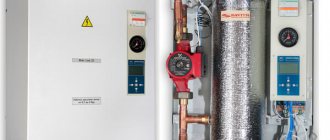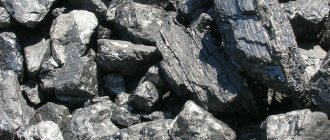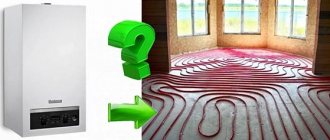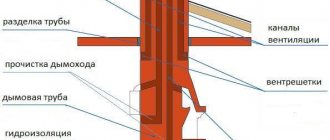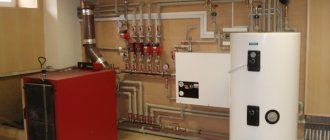Autonomous heating is becoming more and more popular, and most people are starting to purchase single-circuit and double-circuit boilers for apartments and houses. And most of them have no idea what differences gas heating boilers have for a private home, how to choose the most suitable one, and what should be taken into account. After all, each situation requires an individual approach, and for a two-story private house a single-circuit wall-mounted boiler will not be enough, but in an apartment it will look appropriate. Let's figure out why a gas boiler is bad for heating a private home, which one is better to choose and the nuances that should be taken into account.
How to choose the right gas boiler for heating
Many people make the mistake of considering a gas boiler to be the only source of autonomous heating. Although we will consider them specifically, it is worth mentioning that, depending on your needs, you can choose devices using other energy sources:
- In rare cases, when there are hot springs near your home, it is much easier to install a pump and use the already heated water, rather than wasting additional resources.
- Electric heating methods are best suited for garden houses, especially if the buildings are located far from gas mains. After all, transporting several gallons of gas to the dacha every winter is a rather labor-intensive task, and also dangerous if left there unattended for a long period of time.
- But for most needs it is enough to use a gas boiler; all it needs is a nearby highway. If you do not live far from the city, then obtaining permission to connect devices to the highway will not be difficult.
- There is also a small type - electronic boilers. As in the first case, it is a little incorrect to call them boilers, but they perform the same task, only they use current energy and a heating element for this. They are suitable for apartments, as they do not pose any danger, and an accidentally blown out flame does not pose a risk of gas poisoning. And there is no flame there at all.
Now you have decided on the type of boiler, all that remains is to choose the appropriate model. If you do not take into account the numerous protective mechanisms and automation, which you still have to pay attention to, then the main parameter here is power.
If the boiler is weak, the so-called “cold zones” observed in single-circuit models will begin to appear. This is when the water is heated unevenly, causing the temperature in the building to fluctuate around 5 degrees. If you choose a model that is too powerful, then the only drawback will be a slight overpayment. Therefore, it is always worth taking with a reserve and not being a cheapskate, especially when it comes to security systems.
Sometimes people simply don’t understand why the boiler needs protection from absolutely everything, including short circuits and blowing out the flame. However, manufacturers add this not only for the sake of a big word in an advertising video, but also because they have already received more than one lawsuit due to boiler malfunctions, and they want to protect themselves from this in the future.
You might be interested >> How to properly clean a gas boiler
Therefore, branded boilers of the same series are not on open sale for more than two years, while Chinese ones may be 10 years old. And that’s why you shouldn’t save money and buy used equipment, because the main thing for which you shouldn’t spare money is your safety.
Important: if you purchased a device without automatic shutoff of the gas when the flame is blown out, which are practically no longer found on the market, the slightest breeze can lead to the room being filled with a flammable substance.
The same outcome occurs for hundreds of reasons that manufacturers try to control.
Therefore, in a private house, it is better to make a separate building for a boiler room or at least worry about an extension, so that people do not suffer from a failed device.
So we figured out how to choose a gas boiler and a wall-mounted gas boiler, which is best suited for private houses and apartments. Let's now look at all the nuances of working with gas heating systems.
Determining the thermal power of the boiler
Surely you know the popular methods for calculating the thermal performance of equipment - by area or volume of heated premises. Allegedly, for a dwelling of 100 square meters a 10 kW boiler is taken, for a country house of 200 square meters. m – unit 20 kW.
It is better not to use these approximate methods, since specific conditions are not taken into account - the climate in the area of residence, the degree of thermal insulation of the building, and so on. We suggest using more accurate calculation methods:
- According to the specific heat load per square square of living space, taking into account the location of the room and the number of window openings.
- The same goes for the volume of premises.
- Full calculation using the SNiP formula, taking into account the thickness and thermal insulation of external building structures.
An example of calculating heat loss by area, taking into account the location of rooms and the number of window openings
Comment. All 3 methods are described in detail in a separate guide to calculating the heat load for heating a residential building.
Knowing the heat consumption for heating the cottage, we select a gas boiler based on power as follows:
- if you plan to use the unit only for heating, multiply the resulting figure by a safety factor of 1.2;
- the power of a 2-circuit heat generator providing 2 water draw-off points is best selected with a margin of 1.3-1.5;
- To work with an indirect heating boiler with a volume of 200-300 liters, you will need a gas single-circuit boiler with one and a half capacity reserve (multiply by a factor of 1.5).
Let's give an example. For heating a private home with an area of 100 square meters. m is calculated to require 9 kW of energy. The minimum power of a gas heater excluding DHW will be 9 x 1.2 = 10.8 kW, a double-circuit boiler - 9 x 1.3 = 11.7 kW. If you need to heat the storage tank, the unit’s performance increases to 9 x 1.5 = 13.5 kW. Next, we select the nearest higher-power model from the line of heaters - 12 and 15 kW, respectively.
Features of gas heating systems
Still, to choose a suitable device, just look at the rating of gas boilers. But what advantages do gas boilers have over other energy sources, and how does this manifest itself in everyday life?
As already mentioned, the heating system can be built on other energy sources. The very essence of the boiler is to heat a certain volume of water and then send it through the pipes. As a result, the liquid will begin to release heat into the building, and the temperature will gradually rise. But we did not mention the “triangle” of choice, which should be applied when considering each type of ASO (autonomous heating system):
- Your total budget allocated for the creation of an ASO.
- The efficiency and practicality of the device in the use of the resources provided to it, the necessary monthly costs for heating the entire building.
- Ergonomics and dimensions of the boiler. The more complex the installation, the more money from the budget will be spent on paying for the services of specialists from the gas company.
In all respects, two varieties are in the lead: gas boiler and electric. Here it is worth understanding that gas boilers are larger and much more dangerous, because in the event of a breakdown, leaks of flammable substances are possible. On the other hand, they are a little more economical and cost less. Even if there is no gas main nearby or your gas has been turned off, you can always use cylinders. And this is much simpler than an autonomous energy source, which is necessary to start electric boilers if your lights are turned off.
That is why in private homes it is better to take the gas variety. But, when choosing a product, terms such as “Single-circuit”, “Double-circuit” will often flash before you. How to understand which gas boiler is better, because even the best gas boilers for a private home, the ratings of which are posted on the seller’s website, may not suit your conditions of use. Let's figure out which gas boiler to choose and when it is better not to use it at all.
You can read about the pros and cons of single-circuit and double-circuit gas boilers at the link.
Wall mounted
The main advantage of wall-mounted heat generators can be considered their accessibility. Every well-known brand is represented by at least several lines of this type of equipment.
Pros of wall-mounted units
The main advantages of the wall installation method include:
- significant savings in living space;
- compactness and aesthetic appearance that fits into almost any interior;
- the ability to quickly switch, if necessary, from pipeline gas to liquefied fuel;
- providing households with hot water through an indirect heating system.
Cons of wall-mounted units
Wall-mounted models of gas heat generators are not suitable in terms of power parameters for large households.
In addition, the disadvantages of wall-mounted gas installations include:
- high demands on coolant quality;
- reduction in the efficiency of space heating while simultaneously turning on the water heating circuit;
- longer time required for heating.
The design of wall-mounted gas heating systems usually uses radiators made from small-diameter copper tubes.
If water with a high content of soluble salts or impurities circulates in the heating circuit or hot water supply system, this can lead to boiler failure.
Replacing a heat exchanger or repairing it is quite expensive. To avoid this, experts recommend using special liquids in heating systems, or pre-treating the water by purifying and softening it.
In which houses is it not recommended to install a gas boiler?
The already mentioned parameter of unsafety of a gas boiler should be taken into account when choosing and planning a room. If you do not have the opportunity to build a separate boiler room, it is better to think several times before installing the device in the kitchen.
You might be interested >> Description of the double-circuit gas wall-mounted boiler Baxi
First of all, if you live in a region with excessively dry air, and you have a lot of flammable materials in your house (the walls are insulated with materials of standard G2 and higher, and the main material is wood), then a gas boiler is the worst choice for ASO, which you only you can do. This is where the electric version comes into play, safer and easier to install. In addition, with a power above 60, placing boilers in the kitchen is completely prohibited according to fire safety rules.
But don't worry - you will still have to send an application and house planning documents to the gas company before installation. And there the specialists will immediately see if there is a serious danger to the residents and refuse to install it. Also, you should not install boilers in houses where ventilation is poor or there is no chimney. When burned, gas breaks down into toxic substances and carcinogens, and the breakdown of intermolecular bonds leads to the release of heat. If you do not take care of the removal of all these combustion products, you will face extremely unpleasant consequences.
Installation
According to the installation principle, boilers are:
- On the wall;
- On the floor.
If you decide to choose a floor-standing gas boiler, then most likely this model has impressive dimensions. And sometimes it requires a separate room so that it is easy to install the pump, all its elbows, taps, boiler and not violate the installation rules.
In addition, floor-standing appliances often make a lot of noise, and therefore also require a separate room.
Installation will not be easy. The characteristics of floor-standing gas boilers require a chimney that needs to be cleaned from time to time. But at the same time, such a boiler is powerful and can provide heat to a large house.
Choose a wall-mounted gas boiler if you need a compact device for a small room. Installation is simple; combustion products can be removed either through the chimney or through the wall.
The disadvantages include lower power (up to 35 kW) compared to floor-standing boilers, but this is enough for an ordinary apartment.
Advantages of gas boilers
As already mentioned, gas boilers are not only economical, but also quite cheap. Yes, their ergonomics suffer, but such a device can be installed on almost any private plot of land; it is enough to have a gas main nearby. In addition, a modern gas boiler is not at all as dangerous as it was 10 years ago.
Thanks to the automation of many aspects of operation, it has a thousand and one fuses that will protect you from almost any situation. This includes heat sensors that shut off the gas if anything happens to the flame. Read the article about how to choose the right automation for gas heating boilers.
Smart electronics
You can choose a gas boiler for heating a private home with additional functions that, although they increase its cost, make operation safe and convenient:
- Flame sensor – turns off the gas supply independently if there is no flame;
- Blocking – the program turns off the boiler if the gas supply stops;
- Traction control sensor - ensures that carbon monoxide does not form so much that it becomes dangerous, and ensures that the device operates without accidents.
Rating of the best boilers for private homes
Among modern boilers, BAXI SLIM 2300Fi and PROTHERM BEAR 40 TLO deserve special attention. The first is a typical representative of modern technologies. You can install it either in an apartment or in a separate boiler room. The device is protected from everything, even down to low temperatures. And you can control Baxi directly from your mobile phone, if you suddenly want to lower the temperature when you are already in bed.
The second device is the best solution for apartments and small private houses. A floor-standing boiler, the size of a washing machine, has only one drawback - the need to change the thermocouple every few years. Otherwise, this is the best solution for any situation, and it is not very expensive, being in the middle price segment.
With one circuit
The design of a single-circuit gas boiler implies its use only for heating rooms with a connection to the heating system.
A typical single-circuit boiler consists of the following elements:
- housings with direct and return coolant supply pipes;
- combustion chambers with gas burner;
- smoke exhaust systems;
- heat exchanger;
- built-in or remote circulation pump and expansion tank;
- automation units and sensors for various purposes.
In simple single-circuit boilers, the heat from the burning fuel is transferred through a heat exchanger to the coolant circulating in the heating system. Some of the heat is lost through the chimney, which reduces the overall efficiency of the equipment.
Some models of single-circuit heat generators are equipped with a special heat exchanger, which is installed in the chimney system. It allows you to take most of the heat from the exhaust gases. This type of equipment is called condensing equipment.
With built-in boiler
Heat generators with a built-in boiler are devices in which a heating circuit and an indirect heating tank of a hot water supply system are combined into a single compact system. When the boiler operates, not only does the space heat up, but also the necessary supply of hot water is formed. Compared to a flow-through system, water from the tank flows out of the tap immediately hot, which avoids wastage.
We recommend an article on the topic! Flueless boiler - what you should pay attention to when choosing.
Is it a condensing boiler or a regular boiler?
Conventional boilers have a favorable price, but unfavorable energy consumption, a tenth of which flies down the chimney. Condensing systems prevent it from doing this by cooling the gases and steam and using this so-called latent heat.
As a result, it is by this tenth that condensing boilers are more useful than conventional boilers, and the same indicator is present in fuel economy. True, you have to pay for this with a higher price for such equipment.
It makes sense to think about it - economical fuel consumption will allow you to make up the difference in price when purchasing a condensing boiler over a period of time.
With two circuits
Double-circuit heat generators combine two devices at once: a water heater and a heating device. The water heater provides the house with hot water with connection to the DHW (hot water supply) system. When working to heat a home, the boiler functions in the same way as an instantaneous water heater.
Double-circuit units have two operating modes:
- heating the coolant in the heating system;
- heating water in the DHW system.
When the first mode is turned on, the gas burner operates until the coolant reaches the set temperature, then turns off. The coolant circulating in the system gives off heat, and when the temperature drops, the automation turns the burner on again.
In water heater mode, the gas is ignited at the moment the hot water tap is opened.


